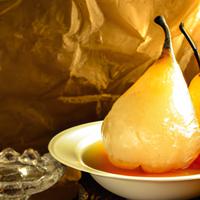
1 serving (100 grams) contains 70 calories, 0.3 grams of protein, 0.1 grams of fat, and 18.0 grams of carbohydrates.

Log this food in SnapCalorie

Nutrition Information
Calories |
166.7 | ||
|---|---|---|---|
% Daily Value* |
|||
| Total Fat | 0.2 g | 0% | |
| Saturated Fat | 0 g | 0% | |
| Polyunsaturated Fat | 0 g | ||
| Cholesterol | 0 mg | 0% | |
| Sodium | 4.8 mg | 0% | |
| Total Carbohydrates | 42.9 g | 15% | |
| Dietary Fiber | 5.2 g | 18% | |
| Sugars | 35.7 g | ||
| protein | 0.7 g | 1% | |
| Vitamin D | 0 mcg | 0% | |
| Calcium | 26.2 mg | 2% | |
| Iron | 0.5 mg | 2% | |
| Potassium | 276.2 mg | 5% | |
* Percent Daily Values are based on a 2,000 calorie diet. Your daily values may be higher or lower depending on your calorie needs.
Food Attributes
Source of Calories
About Cooked pears
Cooked pears are a delicious and versatile treat often enjoyed as a dessert or snack, originating from European kitchens where fruit poaching is a long-standing tradition. Typically simmered in water, wine, or sugar syrup with spices such as cinnamon or cloves, cooked pears boast a soft, tender texture and naturally sweet flavor. Nutritionally, they retain much of their fiber content, supporting digestion, and are rich in vitamin C and antioxidants, which help boost immunity and fight free radicals. However, added sugars in some recipes can increase calorie content, making moderation key for those watching their intake. Whether featured in French poached pear recipes or served alongside cheeses in Mediterranean dishes, cooked pears offer a wholesome and satisfying option with countless variations to suit health-conscious or indulgent preferences.



